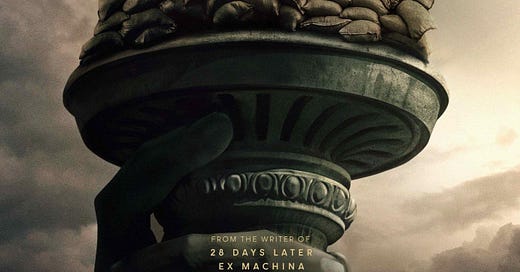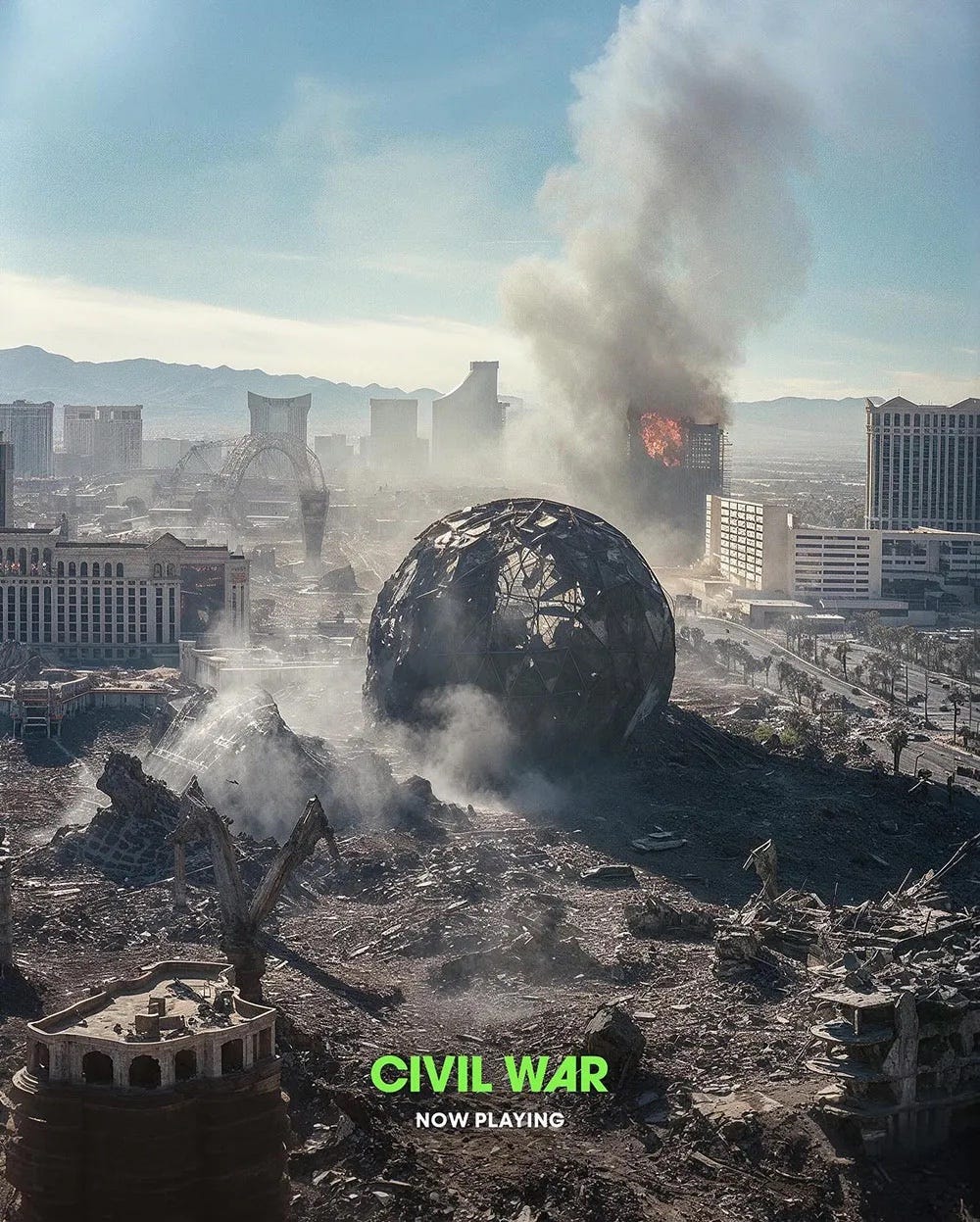“Settle in for a thriller about what civil war might really look like in today’s America, divorced from today’s social, political, or even geographic reality. But it’s still definitely worth a watch because Alex Garland can direct the crap out of an action scene. It’s packed full of haunting and beautiful imagery, and it’s not afraid to actually speak out about one timeless truth: the more nonchalant Jesse Plemons acts, the more terrifying he becomes.”
-Honest Trailers
Judge this book by its cover.
The problem with Alex Garland’s Civil War is clear from the poster. Behold: two snipers in a nest built atop Statue of Liberty’s torch. It’s a perfect, if heavy handed, metaphor for modern America.
But this striking image makes less sense the more you think about it.
The very attributes that make The Statue of Liberty a great landmark make it a remarkably bad spot for snipers. It’s elevated, yes—but what would those snipers even aim at? Boats in the East River? Liberty Island is surrounded by water on all sides and exposed to strong, unpredictable winds. At torch height, these winds are even stronger, which is why the statue itself is designed to sway, making precise aim nearly impossible.
In this way, the poster brilliantly, if unintentionally, captures the movie’s core flaw: an intriguing “what-if” that rests on a shaky foundation—one that, when poked, crumbles into an avalanche of frustrating flaws.
This all gets even messier when you learn that all of the posters for Civil War were generated by AI.
Yet the core problem with the provocative images of commandos at San Francisco’s Palace of Fine Arts or Vegas’s Sphere in ruins isn’t that they’re computer generated; it’s that they’re irrelevant to the movie they exist to market.
To spoil it: none of these scenes or even locations appear in the film.
For a movie about how images of war shape the meaning of the war, why does this one seem to care so little about its own meaning?
This isn’t the first film with a pronounced disconnect between marketing and substance.
Danny Boyle’s Sunshine (also written by Garland) is a dark musing about mortality and the meaning of life that was mistakenly marketed as an action adventure space romp. Jennifer’s Body was meant to be a progressive feminist horror film that girls could relate to, until the studio insisted on pitching it as an excuse for male viewers to ogle Megan Fox.
However, when I saw the trailer for this one, I had hope that Alex Garland of all people could do the premise justice. With A24’s backing, he had fearlessly tackled AI ethics in Ex Machina and self-destruction in Annihilation. I thought he might be the perfect director to bring his cerebral lens and provocative style to a nation about to opt for Donald Trump: 2 Trump 2 Furious.
The posters lied to you but I won’t.
Civil War isn’t really about a US Civil War; it’s about the purpose and the ethics of photojournalism. This explains the whiplash and pushback from many viewers and critics.
This movie has the opposite problem of Snakes on a Plane—its title is the last thing it cares about. Instead of using photojournalism to examine a nation at war, Garland uses the war to examine photojournalism. This makes it the rare film that would have been 200% better just by changing the title. If they’d called it “Shoot to Kill” or “Kill Shot,” audiences could have digested the conflicts and questions shown onscreen instead of puzzling over all of the things not being shown.
The problems with this movie aren’t limited to the marketing, however.
They stem from the fact that Garland is either unwilling or unable to engage with the politics and substance of a hypothetical US Civil War, interested only in how such a conflict might be photographed. In Garland’s vision, Texas and California secede together, fighting Washington DC alongside Florida. In real life, the only thing California and Texas can agree on is that they’d never secede together. As one critic quips, this alliance is “about as likely as Sweetgreen/Kentucky Fried Chicken combo restaurant.” The only coalition less stable than one including both California and Texas would be one forced to include Florida as well. Texas won’t even share a power grid with the U.S. for the love of God—basic things Garland could have researched.
Details like this matter. A premise like this needs a creator willing to create a plausible hypothetical. Refusing to do so makes your gritty war movie feel hollow and vague.
As the delightful Honest Trailer points out,
“It’s not interested in the causes people are willing to die for, or why the nation split along random state lines, or what effect the war is even having. It’s just a vague warning about polarization that avoids the who, what, why, or how we are being polarized.”
Even the characters in this movie don’t have consistent or meaningful reactions to the amorphous conflict, further straining the premise. At one point, our merry band of photography nerds encounters a pocket of civilians running a quaint shop who seem blissfully unaware of the war. When an incredulous Joel asks a bored employee if she knows about the civil war, she responds, “Oh, sure, but we just try to stay out.” While Garland may have meant this as a commentary on how quickly we normalize and dissociate from violence, chaos, and dysfunction in modern America, for me it had the opposite effect. If deflated the already murky stakes, like cutting to a Jurassic Park employee clueless that dinosaurs have escaped or a hobbit assuming the ruckus outside Mordor is just Sauron’s new pickleball court.
This movie is as evocative as it is flawed. It offers more style and provocation than clear or coherent themes, and its story story circles around divisive ideas without truly engaging with any of them. In aiming his lens at America’s complexities, Garland seems torn between saying something profound and simply capturing the chaos. Ultimately, Civil War feels like a fever dream, not a manifesto—a vivid but shallow spectacle as polarizing as the nation it depicts.
However, our world has enough negativity in it already, so I should mention that this movie isn’t all bad. The cinematography is stunning, and the action scenes are engrossing. The cast delivers strong performances across the board that are remarkably hard to look away from.
For example, I spent 30 minutes wondering why Joel looked so familiar until I realized he was played by Wagner Moura, who I knew only as Pablo Escobar in Netflix’s Narcos. For everything that’s wrong with Civil War, no other film has ever made me want to stand up mid-flight and announce to my fellow United passengers:
“You guys, Pablo Escobar is jacked now! I wonder what his fitness routine is like…”






Reilly, really loved your review and you're a great writer, and it really made me want to leave a comment because I completely disagree with almost everything you said.
First of all, I had a totally different context for seeing the movie - Erin was out of town and I went on a whim not knowing much about the film and halfway through realizing I saw a poster on like reddit or something. So I will say hype does change my perspective.
First - the marketing, which again I saw after the film and totally changes my perspective BUT I love that they made a world and only showed us 1 slice of it. Leaving the rest to our imagination with only the breadcrumbs of teasers to go off of. Too many movies today explain EVERYTHING and I like that they focused in on one aspect of life there leaving us to only assume we know what's going on. It doesn't matter to the plot so why not let our imaginations run wild? The movie had a good run time, so why complicate? If it was a TV show that would be a little different and could be done like man in the high castle but as a movie I think by focusing on one aspect they really built out the characters, their motivations, and also we got a great sense of what NY-DC area was like rather than half versions of all those things, so I do think it was a good choice.
I thought the disengagement from current politics was also a great decision. It dissociates it from our current political alignment, which can change, and I think will make it more timeless. Idk maybe this is a bold and horrible prediction, but a civil war, as shown in that movie, is not happening any time soon, so setting it in the present day, but making it an alignment that never could happen today just let me relax and enjoy it.
I think the above is your main complaint, that he doesn't wrestle with what a civil war in our current polarized state would look like. I'm so relieved he didn't try. I think it's impossible and I'm tired of commentaries on things like that. There's no way to do it well in my opinion, so making current day style characters we can relate to, technology we understand, but a totally unrealistic political alignment made me like the movie more than if he made some grand commentary on trump voters.
The "quaint shop" scene - I think this was as much about how we normalize crazy things as it was saying not everyone is involved in the civil war. Most people were just living their lives. They're there, they exist, and they might be the majority in this world. I thought it was good to engage with them to in show that and also provide a counterbalance to how intense the main characters' lives were.
I also just want to mention my favorite quote in the movie I don't think you got to but when Kristen dunst asks the guy why he's shooting at them and they say "because they're shooting at me" that right there encapsulates the movie for me. It's not necessarily just about a potential US Civil War it's about all war. It's pointless but you need to stay alive so you shoot the people who are shooting at you.
Now on to my biggest complaint about the movie, which of course has to do with the logistics. I saw this movie right after a trip I took from DC to Charlottesville to Philadelphia and let me tell you, it makes no sense to go from NYC to Charlottesville and then to DC and somehow avoid DC on the way. I think he chose Charlottesville because it's such a a lightning rod town now, and sure that's fine, but they could have chosen like Gettysburg or something as a place to gather before the great attack. It's just such a sn unnecessary risk to go around DC that they hardly even grapple with. Come on!
Anyway loved reading your review, and then writing a review of your review. So goes my first substack comment ever and hope to see you again soon to yell about civil war in person.